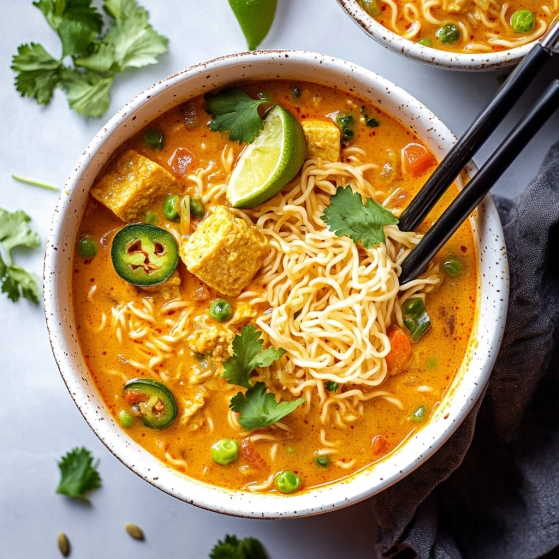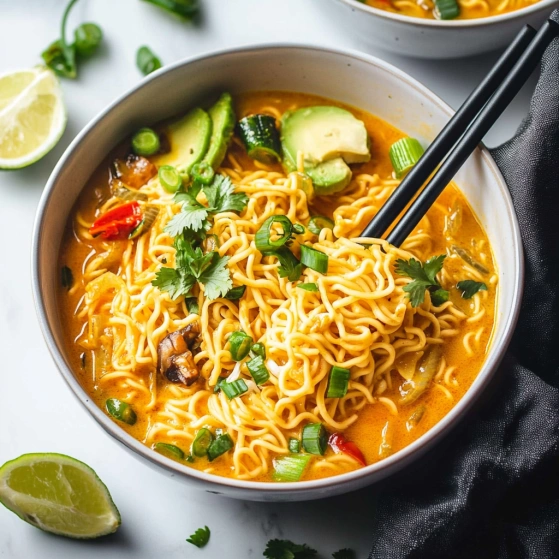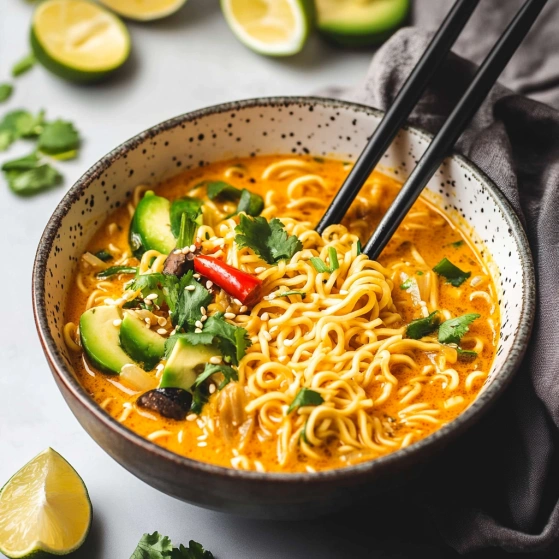 Pin it
Pin it
This vegan curry ramen transforms your kitchen into a cozy noodle shop in just 20 minutes. The fragrant coconut broth marries red curry paste with tender vegetables and chewy ramen noodles for a satisfying meal that feels like a warm hug in a bowl.
I created this recipe during a particularly busy week when I needed something quick but didn't want to sacrifice flavor. Now it's my go-to comfort food whenever rain taps against my windows or when friends drop by unexpectedly.
Ingredients
- Sesame oil: Provides a nutty base that enhances the Asian flavors of this dish
- Shredded carrots: Add natural sweetness and beautiful color contrast
- Sugar snap peas: Bring freshness and a delightful crunch
- Mushrooms: Contribute earthy flavor and meaty texture look for firm shiitakes or creminis
- Red curry paste: Is your flavor powerhouse choose Thai Kitchen for mild or Mae Ploy for more heat
- Curry powder: Layers in warm aromatic notes Indian varieties work beautifully here
- Fresh garlic and ginger: Are non-negotiable for authentic flavor mince them just before cooking
- Vegetable broth: Forms the foundation of your soup choose low sodium to control salt levels
- Coconut milk: Creates the luxurious creamy broth full-fat yields the richest results
- Ramen noodles: Traditional dry ramen works best avoid the instant packets with seasoning
- Fresh lime juice: Brightens the entire dish and balances the richness
Step-by-Step Instructions
- Heat the Base:
- Warm your sesame oil in a large pot over medium heat until it shimmers slightly but doesn't smoke. This usually takes about 30 seconds and prepares the perfect foundation for your vegetables.
- Sauté the Vegetables:
- Add your shredded carrots, sugar snap peas, and mushrooms along with a generous pinch of salt and pepper. Cook for exactly 3 minutes, stirring occasionally but not constantly. You want the vegetables to soften slightly while maintaining their texture and bright colors. The mushrooms will begin releasing their moisture.
- Bloom the Aromatics:
- Add your curry paste, curry powder, minced garlic, and ginger to the pot. Stir continuously for a full minute, allowing the heat to release the essential oils from the spices and aromatics. The mixture should become intensely fragrant, signaling that the flavors are developing properly.
- Create the Broth:
- Pour in your vegetable broth and coconut milk, stirring to incorporate all the spices from the bottom of the pot. Season thoughtfully with salt and pepper, tasting as you go. Remember that the broth will reduce slightly, concentrating the flavors.
- Simmer and Intensify:
- Increase your heat to medium-high and bring the mixture to a gentle simmer. You should see small bubbles consistently breaking the surface, but not a rolling boil that could make the coconut milk separate.
- Cook the Noodles:
- Add your ramen noodles directly to the simmering broth. Ensure they're fully submerged, pushing them down gently if needed. Cook for exactly 10 minutes for al dente noodles with a pleasant chew. Stir occasionally to prevent sticking.
- Finish and Brighten:
- Remove the pot from heat and squeeze in the juice of one whole lime. Stir to distribute the brightness throughout the broth. This final acid element balances the richness of the coconut milk and rounds out the flavor profile.
 Pin it
Pin it
The red curry paste is truly the heart of this dish. I discovered its transformative power while traveling through Thailand, where a street vendor showed me how a single spoonful could turn simple ingredients into something extraordinary. My first batch at home was a revelation, and I've been perfecting the balance ever since.
Storing Leftovers
This curry ramen stores beautifully in the refrigerator for up to 3 days in an airtight container. The flavors actually deepen overnight as the ingredients have time to meld together. When reheating, add a splash of vegetable broth or water as the noodles tend to absorb liquid as they sit. Warm gently on the stovetop rather than using a microwave to maintain the texture of the vegetables.
Making It Your Own
The beauty of this recipe lies in its flexibility. You can easily substitute different vegetables based on what's in season or your personal preferences. Bell peppers add sweetness and color, baby bok choy provides a tender crunch, and spinach wilts beautifully into the broth at the last minute. For protein lovers, add cubed tofu, tempeh, or even a soft-boiled egg for non-vegans. The broth serves as a perfect canvas for your culinary creativity.
 Pin it
Pin it
Serving Suggestions
Serve this ramen in deep, warmed bowls to keep it hot longer. The traditional way to enjoy ramen is with both chopsticks and a soup spoon, slurping encouraged! Create a colorful garnish station with fresh cilantro, thinly sliced jalapeños, lime wedges, bean sprouts, and chopped scallions. A drizzle of chili oil adds beautiful color and heat for those who enjoy an extra kick. For a complete meal, pair with a simple side salad dressed with rice vinegar and sesame oil.
The Rich History of Curry Ramen
This fusion dish represents the beautiful marriage between Japanese ramen culture and Southeast Asian curry traditions. While traditional ramen has Chinese origins dating back centuries, curry varieties gained popularity in the mid-20th century as global flavors began to cross-pollinate. This particular version draws inspiration from Thai red curry rather than the Japanese curry more commonly paired with ramen in Japan. The result is a lighter, brighter bowl that honors both culinary traditions while creating something entirely new.
Frequently Asked Questions
- → Can I substitute other vegetables in this curry ramen?
Absolutely! The vegetable base is versatile - try adding spinach, bok choy, bell peppers, or broccoli. Just adjust cooking times accordingly since harder vegetables need more time to soften.
- → How spicy is this dish?
The spice level depends on how much red curry paste you use (1-3 tablespoons). For milder flavor, start with 1 tablespoon and add more to taste. The jalapeño garnish is optional and can be omitted for less heat.
- → What type of ramen noodles work best?
Traditional dried ramen noodles work perfectly. For a healthier option, look for whole grain ramen or rice noodles. Fresh ramen noodles are delicious but require less cooking time (about 2-3 minutes).
- → Can I make this ahead of time?
The broth can be prepared a day ahead and refrigerated. When ready to serve, bring to a simmer and add the noodles. For meal prep, store the broth and cooked noodles separately to prevent the noodles from becoming soggy.
- → Is there a substitute for coconut milk?
While coconut milk provides the signature creamy texture, unsweetened cashew cream or silken tofu blended with a bit of water can work as alternatives. These will change the flavor profile slightly but maintain the creamy consistency.
- → What's the best way to store leftovers?
Store leftover curry ramen in an airtight container in the refrigerator for up to 3 days. The noodles will continue to absorb liquid, so you may need to add more broth when reheating. For best results, store noodles and broth separately.
